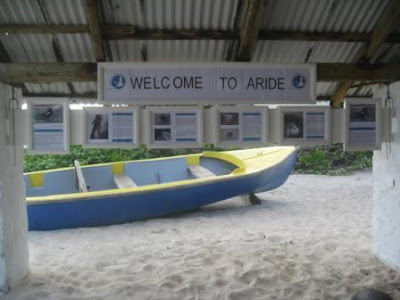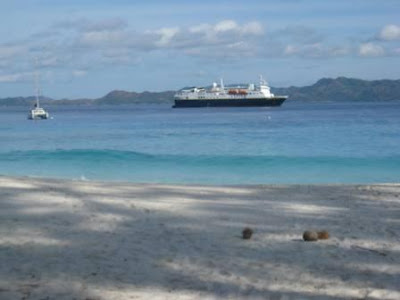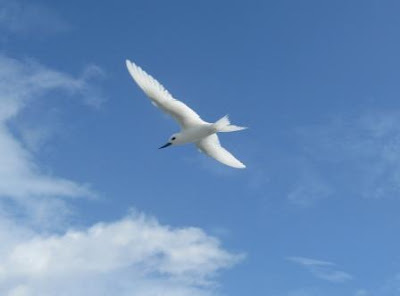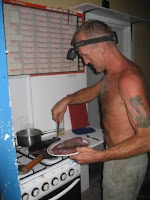This month already we have greeted more visitors on the shores of Aride than has ever been done since the island became open to visitors as a nature reserve in 1978.
 Already with still 5 working days to go during April we have had 509 paying guests to the island and including non paying visitors this rises up to over 560. Now this may not sound a lot but when the average years total visitor figures are in the region of 2,000, this means we have already achieved a quarter of this figure in month 1. The only month that has ever come close to this was 489 paying guests in Feb 2004, apart from this the average for this time of year is more in the region of the 300 mark.
Already with still 5 working days to go during April we have had 509 paying guests to the island and including non paying visitors this rises up to over 560. Now this may not sound a lot but when the average years total visitor figures are in the region of 2,000, this means we have already achieved a quarter of this figure in month 1. The only month that has ever come close to this was 489 paying guests in Feb 2004, apart from this the average for this time of year is more in the region of the 300 mark.
So even without electricity, running water or any of those luxuries, the Aride team is doing good, there are times when the office moves with the generator and the laptop is taken to wherever it can be charged,

or we run out of day light and there is still work to be done.

All in all this increase in figures is against all odds, the economy here in Seychelles is suffering like the rest of the world and there was a predicted 30% decline in tourism and then there are the pirates, that are currently operating in Seychelles waters. So far 3 boats have been hijacked and 10 Seychellois have been taken hostage and apparently they are only 2 hours away from here – if you believe what the papers say – won’t find much here though – have already banked the month’s money!! 

We are hoping that this success is the results of the hard work we have been putting in to marketing and improving the visitor experience. With limited resources we have installed new displays in the boatshed, tarted up the shop

and generally become far more professional in the way we greet our guests, we are flexible in our opening times and welcome all shapes and sizes of boats, and it seems as though it is paying off.

Now before you get concerned that island life is getting to me and that I am craving for human company and need to be amongst large numbers of people, don’t worry I haven’t changed – still as antisocial as ever. The significance of more visitors is literally more money to spend, all the money we raise goes straight back into the island, whether it is spent on employing more staff or buying a new boat – so at the start of the financial year this will put our Chairman (who is an accountant) in a very good mood!


 Every so often this hits home and today as I showed a group of the local school children round, it reminded me what a special place Aride is. We are just so spoilt, the young people were able to stand no more than a metre from white tailed tropic birds, fairy terns, clear the ground for magpie robins to feed in front of them and watch geckos protect their eggs on our spectacular Banyan tree. Aride inspires many people, adults and children alike and I still feel privileged that part of my job is to facilitate this, to open up this wonderful island for visitors, to let them too enjoy the wealth of wildlife it supports.
Every so often this hits home and today as I showed a group of the local school children round, it reminded me what a special place Aride is. We are just so spoilt, the young people were able to stand no more than a metre from white tailed tropic birds, fairy terns, clear the ground for magpie robins to feed in front of them and watch geckos protect their eggs on our spectacular Banyan tree. Aride inspires many people, adults and children alike and I still feel privileged that part of my job is to facilitate this, to open up this wonderful island for visitors, to let them too enjoy the wealth of wildlife it supports. 








 However it is quite apparent that Europeans find it rather more exciting using candles and torches, it can become a way of life, than the locals. We had a new ranger from Mahe start last week and it isn’t the best introduction to life here; no running water which you can kinda cope with, but no electric, no fridge, just a communal freezer that is kept chilled and the smelly water that runs out of the bottom of it. But worst of all seems to be the island recently acquired a TV which was very popular with rangers and volunteers, but now sits in the corner teasing – and there is a now a lot of hope resting on one of our rangers, Brian, who in a previous life was an electrician, as he now does his best to harness the energy from the sun for power.
However it is quite apparent that Europeans find it rather more exciting using candles and torches, it can become a way of life, than the locals. We had a new ranger from Mahe start last week and it isn’t the best introduction to life here; no running water which you can kinda cope with, but no electric, no fridge, just a communal freezer that is kept chilled and the smelly water that runs out of the bottom of it. But worst of all seems to be the island recently acquired a TV which was very popular with rangers and volunteers, but now sits in the corner teasing – and there is a now a lot of hope resting on one of our rangers, Brian, who in a previous life was an electrician, as he now does his best to harness the energy from the sun for power.


 As for washing up in the dark, I have given up and the resident crabs deal with most of the leftovers on the plates and pans until the morning.
As for washing up in the dark, I have given up and the resident crabs deal with most of the leftovers on the plates and pans until the morning.  But the one thing that no freezer and inefficient fridges mean we have the perfect excuse to go out fishing everyday and today brought in a Dorado – my what a whopper!!
But the one thing that no freezer and inefficient fridges mean we have the perfect excuse to go out fishing everyday and today brought in a Dorado – my what a whopper!! 
 The underwater world is a fascinating one, full of strange creatures, spiny, spongy, colourful and bizarre. The water is so clear it was wonderful to see the regenerating coral,
The underwater world is a fascinating one, full of strange creatures, spiny, spongy, colourful and bizarre. The water is so clear it was wonderful to see the regenerating coral,  to see creatures like sting rays the size of blankets, barracudas over a metre long and to swim with turtles and brightly coloured fish . I learnt how to roll out of the boat backwards, fins and all, just like on the films, how to buddy breathe, to use my lungs like floats; breathing out to take me to the bottom and breathing in to inflate and make me float, and how to sit suspended in the water just off the sea bed. However this is certainly the climate to learn in, no need to wee in your wetsuit here to keep it warm!
to see creatures like sting rays the size of blankets, barracudas over a metre long and to swim with turtles and brightly coloured fish . I learnt how to roll out of the boat backwards, fins and all, just like on the films, how to buddy breathe, to use my lungs like floats; breathing out to take me to the bottom and breathing in to inflate and make me float, and how to sit suspended in the water just off the sea bed. However this is certainly the climate to learn in, no need to wee in your wetsuit here to keep it warm!  The end of financial year revealed that we have had the best year for visitors for the last 12 years with over 2050 paying guests coming ashore. Shop sales were the best ever, with over 76,000 rupees raised in the March alone which covers our monthly wage bill 3 times over, equivalent to £3,300, working out as an average spend of £10 per visitor, modest but not bad for a shop the size of ours!
The end of financial year revealed that we have had the best year for visitors for the last 12 years with over 2050 paying guests coming ashore. Shop sales were the best ever, with over 76,000 rupees raised in the March alone which covers our monthly wage bill 3 times over, equivalent to £3,300, working out as an average spend of £10 per visitor, modest but not bad for a shop the size of ours!


 The breeding season is on its way, with over 45,000 noisy sooty terns having already arrived and punching pigeons, a strange past time of the Madagascar turtle doves use their wings to take punches at each other, as part of establishing their territories. We must enjoy the calm seas while they last, as with the breeding season comes the onset of the south east monsoon with rough seas and driving salt spray – yet another extreme.
The breeding season is on its way, with over 45,000 noisy sooty terns having already arrived and punching pigeons, a strange past time of the Madagascar turtle doves use their wings to take punches at each other, as part of establishing their territories. We must enjoy the calm seas while they last, as with the breeding season comes the onset of the south east monsoon with rough seas and driving salt spray – yet another extreme. 









































































